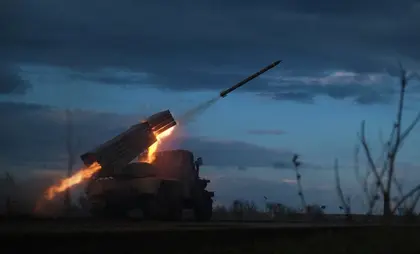The other day, in reports from the front, my attention was drawn to the news that the Russian screenwriter Leonid Korin was killed during fighting in Bakhmut. At first, I assumed that Korin had been in Bakhmut as part of some television film group, sent from Moscow to record the “heroic struggle” of the Russian army against the “Ukrainian fascists.”
But it soon became clear that the screenwriter had signed a contract with the Wagner private army a few months earlier and that he had been killed during a battle against the Ukrainian army. In other words, just like the infamous writer Zakhar Prilepin, Korin had exchanged the pen or computer for a Kalashnikov assault rifle and had gone to kill Ukrainians. As a result, he met his end.
In fact, between 2012 and 2015 Korin was one of the scriptwriters for the ambitious Russian-Ukrainian film project Battle for Sevastopol about the most famous female sniper in the Soviet army – Lyudmila Pavlichenko.
In 1942, Pavlichenko participated in the battle to defend Sevastopol, during which, according to Soviet military historians, she killed the majority of her officially 309 eliminated German soldiers and officers. While those historians were no more concerned with the truth than today’s Russian propagandists, the number is not unrealistic. In addition, Pavlichenko was Ukrainian – born near Kyiv.

Zelensky Meets CIA Director William Burns in Ukraine
Two versions of the film were made: a feature film and a television series. The original language was Russian, but then Ukrainian and English versions were made.
The main roles in the film are played by Russian actors, with episodic roles being played by Ukrainians. Seventy percent of the film’s budget came from Ukraine, including money from the Ukrainian state budget, Russia invested 30 percent. The film was largely shot on location in Sevastopol, but some work was carried out in Kyiv, Odesa, and a small town on the border with Moldova.
The most interesting thing about all this is that filming ended in July 2014: that is, after the annexation of Crimea and the start of the war in the Donbas.
The Russian and Ukrainian premieres of the film took place on the same day – April 2, 2015. Yulia Peresild, who played the sniper Pavlichenko, traveled from Moscow to Kyiv to attend the premiere, and this during one of the bloodiest phases of the Russian-Ukrainian war.
True, in Ukraine the film was renamed. It was released under the title Unbreakable so that Ukrainians would not be irritated by the mention of Sevastopol in recently annexed Crimea.
By the way, the TV premiere of the film also took place simultaneously in Russia and Ukraine – on May 9, 2015, 15 months after the annexation of Crimea!
Very little was written about this film in Ukraine. Neither the Ukrainian producer, Yegor Olesov, nor other Ukrainian participants in the project were very comfortable about advertising a joint Russian-Ukrainian film project about WW II – largely funded with Ukrainian money, while actual Russian attacks on Ukraine were taking place. Nonetheless, the project was completed and the distribution rights to the film were acquired by the American company 20th Century Fox.
You can probably understand why, when I learned about the death of screenwriter Leonid Korin, I immediately assumed that he must have been killed by a sniper – perhaps even a Ukrainian female sniper.
That would be poetic, but it did not happen like that. Korin died in Bakhmut from shrapnel wounds after a shell exploded near him. Significantly, there is a scene like that in the film Battle for Sevastopol where the partner of the main character – a male sniper – dies covering the heroine with his own body when a shell explodes.
Now the Ukrainian producer of that joint Russian-Ukrainian film project, Yegor Olesov, is preparing a feature film about atrocities perpetrated by the Russian invaders in Bucha, near Kyiv.
Meanwhile, Sergey Mokritskiy, the Russian director of the film Battle for Sevastopol, and his wife Natalya, who was the film’s producer from the Russian side, are shooting an adventure film near the annexed Sevastopol.
The film is about a treasure hunt around a British ship that sunk during the Crimean War in the mid-19th Century. The same Russian actors from The Battle for Sevastopol are involved, but, unless you include the regular drone attacks against military facilities in Sevastopol, there is no Ukrainian participation in this project.
You can also highlight the text and press Ctrl + Enter






